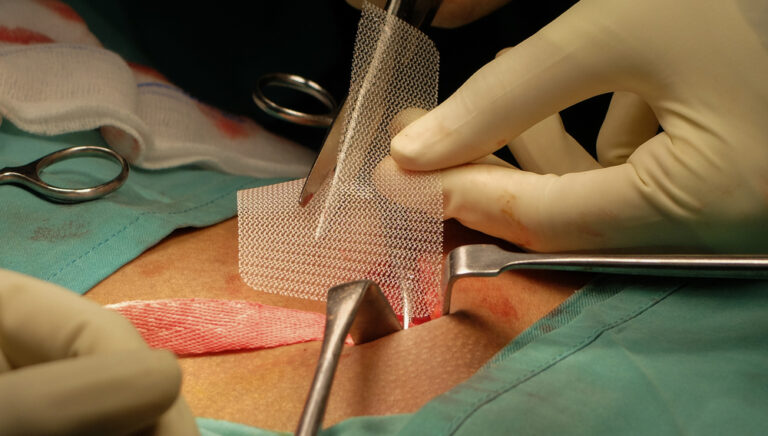Hernia mesh implants are often used to provide support and prevent recurrence after hernia repair surgery. While they have benefited many, complications associated with these devices have led to an increasing number of lawsuits. If you or someone you know has experienced issues after hernia mesh surgery, you might be wondering: what went wrong, and what can be done about it?
Why Are Hernia Mesh Implants Used?
Hernia mesh is a medical device made from synthetic materials or processed animal tissue. It’s placed over or under the damaged tissue to strengthen the area during hernia repair surgery. Designed to reduce the chance of recurrence, hernia mesh is a go-to solution for many surgeons due to its ability to integrate with surrounding tissue. However, like any medical device, it comes with risks. Some patients experience complications that are severe enough to require additional surgeries or long-term medical care.
The Common Complications
Hernia mesh complications vary, but certain issues are reported more frequently. Understanding these risks can help patients advocate for their health:
Chronic Pain – Persistent pain is a leading reason for hernia mesh litigation. This discomfort often stems from nerve damage, improper placement, or the body’s reaction to the mesh.
Infections – Infection occurs when bacteria grow on or around the mesh. Symptoms may include swelling, redness, fever, and discharge near the surgical site.
Mesh Migration – Mesh migration refers to the movement of the implant from its original position. This can cause additional injuries, such as organ damage, and often requires corrective surgery.
Adhesions – Adhesions are bands of scar tissue that develop as the body heals. These can lead to complications like bowel obstruction or chronic abdominal pain.
Bowel Obstruction – In some cases, the mesh causes a blockage in the intestines, resulting in severe pain, nausea, and vomiting. This can be life-threatening and often necessitates emergency intervention.
Why Are Patients Filing Lawsuits?
For many patients, the problems don’t stop at medical complications. Lawsuits against hernia mesh manufacturers typically allege that companies failed to:
● Properly test their products for safety before releasing them to the public.
● Provide adequate warnings about the potential risks associated with their devices.
● Address known design flaws that contributed to mesh failure.
These legal claims often fall under product liability, where manufacturers are held accountable for injuries caused by defective or dangerous products.
What Does the Legal Process Look Like?
Filing a hernia mesh lawsuit might feel daunting, but knowing what to expect can ease some of the uncertainty. Of course, every case is different, but here’s what you can generally expect when moving forward with such a case:
- Initial Consultation – Start by consulting a specialized attorney. They’ll review your medical records and discuss whether you qualify for legal action.
- Documentation – Strong evidence is key. Gather all medical records, surgery notes, and any correspondence with your healthcare providers.
- Filing the Lawsuit – Your attorney will formally file the lawsuit on your behalf, outlining your claims against the manufacturer.
- Discovery Phase – Both parties exchange evidence and information to build their cases.
- Settlement or Trial – Many cases are settled before reaching trial, but if no agreement is reached, the case may go before a jury.
Potential Compensation
Compensation in hernia mesh lawsuits can vary significantly. Settlement amounts depend on factors like the severity of complications, the strength of the evidence, and the medical expenses incurred. Here’s a general breakdown:
● High-value cases – Severe complications like multiple surgeries or organ damage may result in payouts of $1 million or more.
● Moderate cases – Non-life-threatening but significant complications often lead to settlements between $300,000 and $800,000.
● Lower-value cases – Minor issues or temporary complications may result in compensation ranging from $50,000 to $200,000.
Are You Eligible for a Hernia Mesh Lawsuit?
Not sure if you qualify for legal action? Eligibility often depends on these factors:
● You had a hernia mesh implant and experienced complications like pain, infection, or migration.
● Medical documentation links your symptoms to the mesh.
● You’re within the statute of limitations for filing a claim in your state.
If you meet these criteria, consulting an attorney with expertise in hernia mesh litigation is a smart first step.
How to Protect Yourself
If you’re considering filing a lawsuit, there are a few things to keep in mind. First, document everything. From medical bills to surgical records, having clear evidence can strengthen your case. Second, know your rights. An experienced attorney can guide you through the process, ensuring you understand your legal options. Lastly, take action promptly. Statutes of limitations vary by state, so waiting too long could mean losing your chance to file.
Moving Forward With Confidence
Dealing with complications from hernia mesh implants can be overwhelming, but you don’t have to navigate it alone. Understanding the common issues, the legal process, and your options can help you take control of your situation. Whether it’s securing compensation for medical bills or holding manufacturers accountable, taking the next step could make all the difference. By consulting with a legal expert, you’re not just pursuing justice—you’re prioritizing your health and peace of mind.
